Organisational Behaviour Report: Unilever, Module 1, Semester 1
VerifiedAdded on 2023/01/17
|14
|5061
|68
Report
AI Summary
This report delves into the organisational behaviour of Unilever, examining the impact of culture, politics, and power on individual and team performance. It analyzes various motivational theories, including content theories like Maslow's hierarchy and Alderfer's ERG theory, as well as process theories such as goal-setting and equity theory, to assess their effectiveness in achieving organisational goals. The report further explores the characteristics of effective and ineffective teams, supported by relevant team and group development theories. Finally, it evaluates how organisational behaviour concepts and philosophies influence behaviour within a business context, aiming to enhance productivity and profitability. The analysis provides a comprehensive overview of how these elements interact to shape the overall dynamics and success of Unilever as a global consumer goods company.
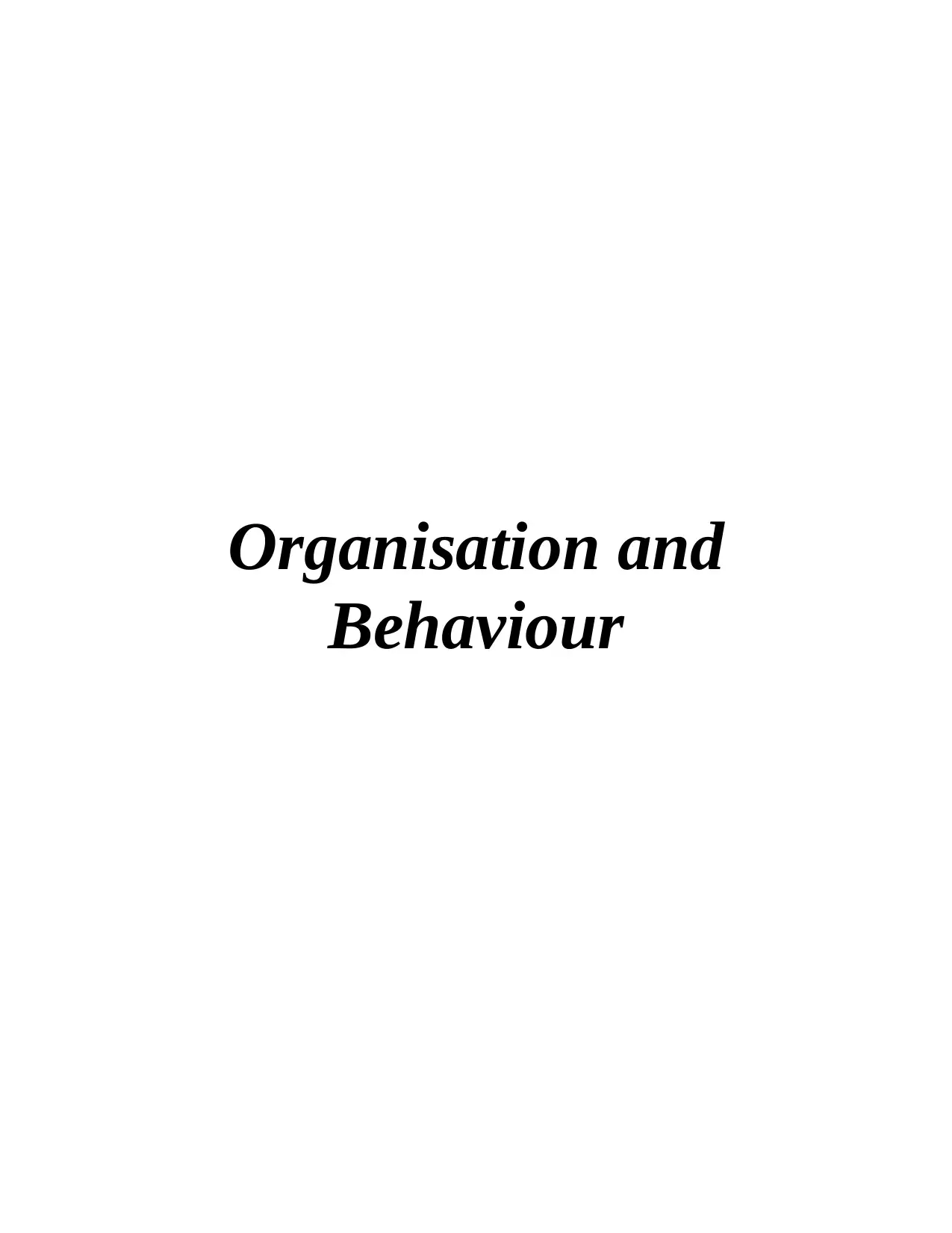
Organisation and
Behaviour
Behaviour
Paraphrase This Document
Need a fresh take? Get an instant paraphrase of this document with our AI Paraphraser
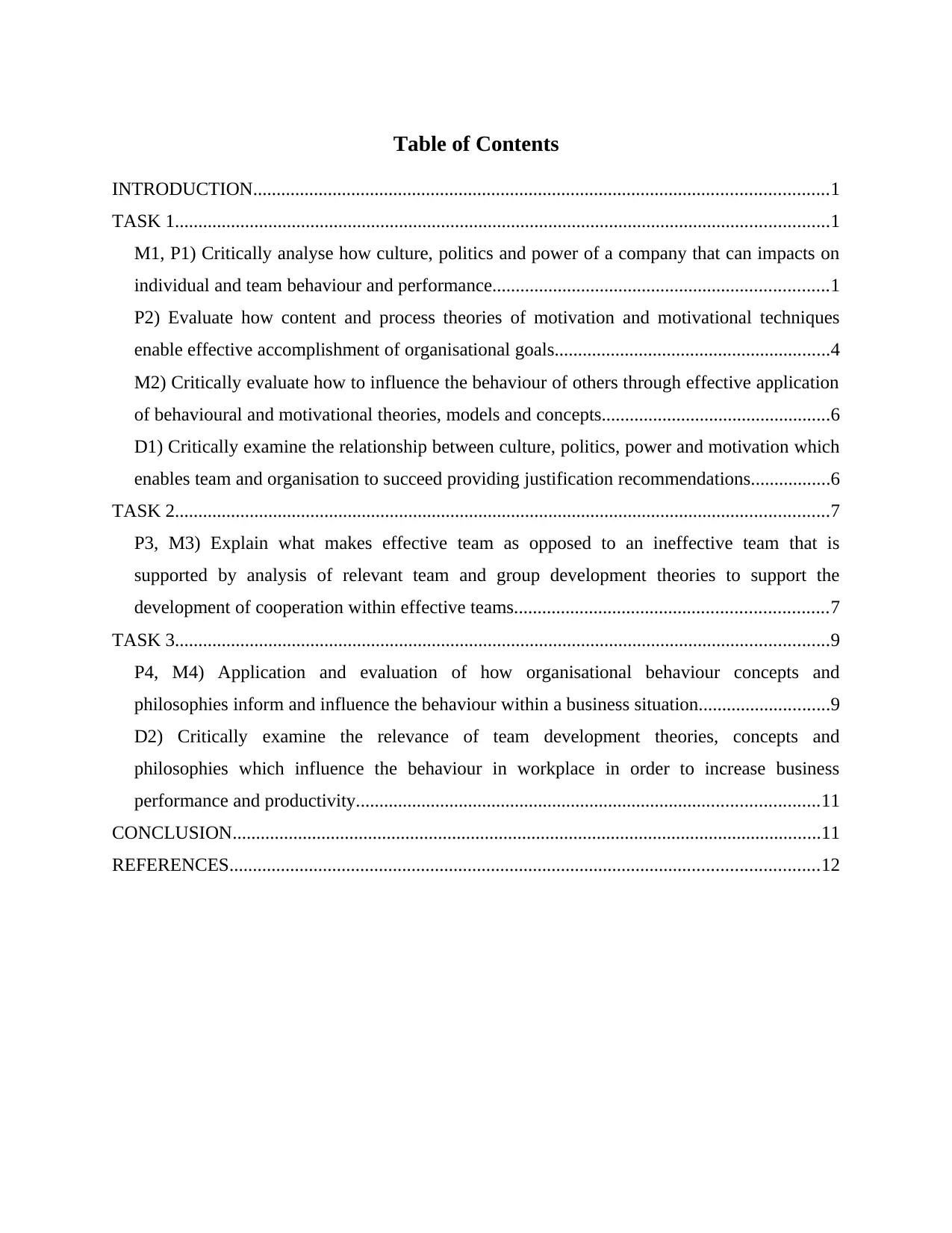
Table of Contents
INTRODUCTION...........................................................................................................................1
TASK 1............................................................................................................................................1
M1, P1) Critically analyse how culture, politics and power of a company that can impacts on
individual and team behaviour and performance........................................................................1
P2) Evaluate how content and process theories of motivation and motivational techniques
enable effective accomplishment of organisational goals...........................................................4
M2) Critically evaluate how to influence the behaviour of others through effective application
of behavioural and motivational theories, models and concepts.................................................6
D1) Critically examine the relationship between culture, politics, power and motivation which
enables team and organisation to succeed providing justification recommendations.................6
TASK 2............................................................................................................................................7
P3, M3) Explain what makes effective team as opposed to an ineffective team that is
supported by analysis of relevant team and group development theories to support the
development of cooperation within effective teams...................................................................7
TASK 3............................................................................................................................................9
P4, M4) Application and evaluation of how organisational behaviour concepts and
philosophies inform and influence the behaviour within a business situation............................9
D2) Critically examine the relevance of team development theories, concepts and
philosophies which influence the behaviour in workplace in order to increase business
performance and productivity...................................................................................................11
CONCLUSION..............................................................................................................................11
REFERENCES..............................................................................................................................12
INTRODUCTION...........................................................................................................................1
TASK 1............................................................................................................................................1
M1, P1) Critically analyse how culture, politics and power of a company that can impacts on
individual and team behaviour and performance........................................................................1
P2) Evaluate how content and process theories of motivation and motivational techniques
enable effective accomplishment of organisational goals...........................................................4
M2) Critically evaluate how to influence the behaviour of others through effective application
of behavioural and motivational theories, models and concepts.................................................6
D1) Critically examine the relationship between culture, politics, power and motivation which
enables team and organisation to succeed providing justification recommendations.................6
TASK 2............................................................................................................................................7
P3, M3) Explain what makes effective team as opposed to an ineffective team that is
supported by analysis of relevant team and group development theories to support the
development of cooperation within effective teams...................................................................7
TASK 3............................................................................................................................................9
P4, M4) Application and evaluation of how organisational behaviour concepts and
philosophies inform and influence the behaviour within a business situation............................9
D2) Critically examine the relevance of team development theories, concepts and
philosophies which influence the behaviour in workplace in order to increase business
performance and productivity...................................................................................................11
CONCLUSION..............................................................................................................................11
REFERENCES..............................................................................................................................12
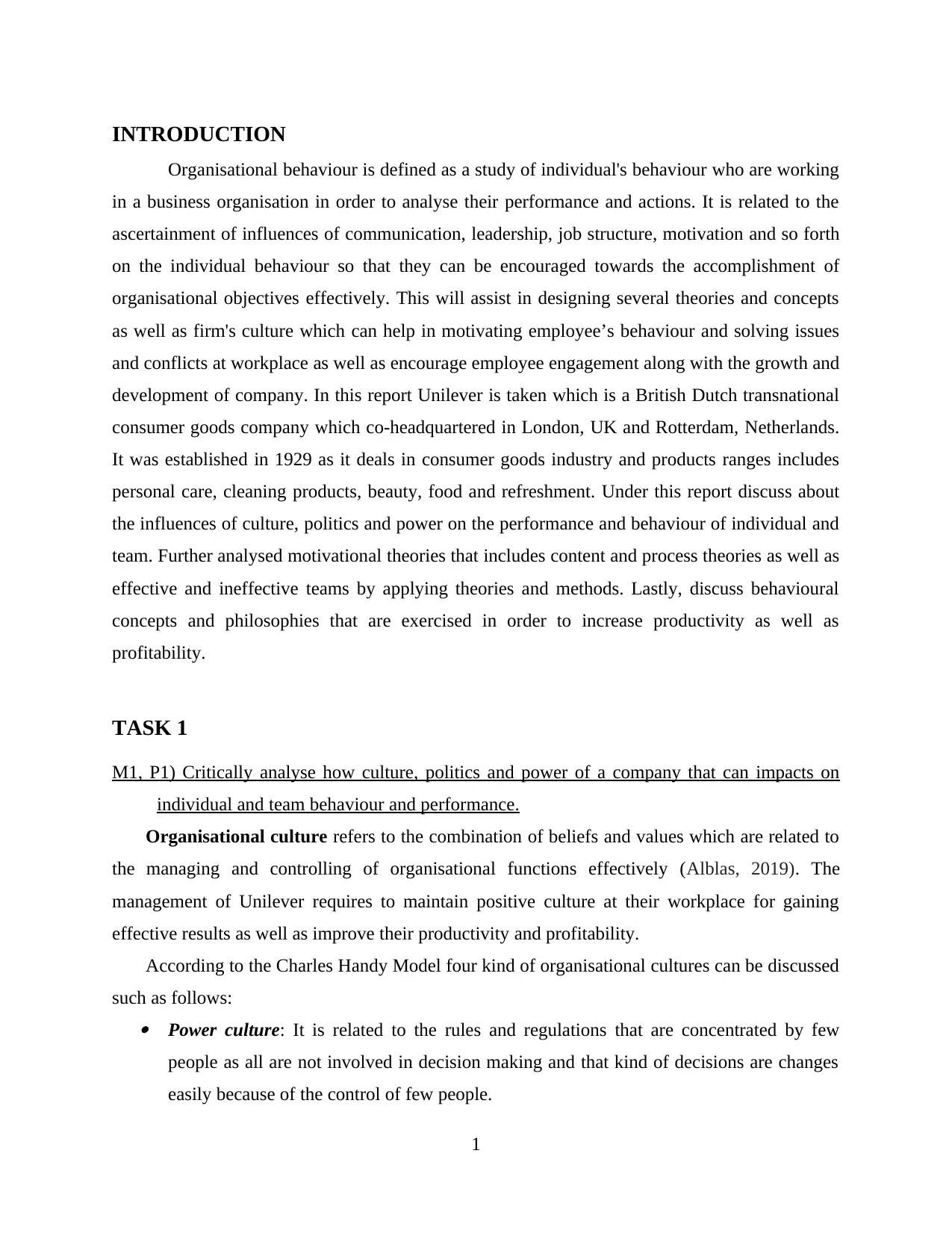
INTRODUCTION
Organisational behaviour is defined as a study of individual's behaviour who are working
in a business organisation in order to analyse their performance and actions. It is related to the
ascertainment of influences of communication, leadership, job structure, motivation and so forth
on the individual behaviour so that they can be encouraged towards the accomplishment of
organisational objectives effectively. This will assist in designing several theories and concepts
as well as firm's culture which can help in motivating employee’s behaviour and solving issues
and conflicts at workplace as well as encourage employee engagement along with the growth and
development of company. In this report Unilever is taken which is a British Dutch transnational
consumer goods company which co-headquartered in London, UK and Rotterdam, Netherlands.
It was established in 1929 as it deals in consumer goods industry and products ranges includes
personal care, cleaning products, beauty, food and refreshment. Under this report discuss about
the influences of culture, politics and power on the performance and behaviour of individual and
team. Further analysed motivational theories that includes content and process theories as well as
effective and ineffective teams by applying theories and methods. Lastly, discuss behavioural
concepts and philosophies that are exercised in order to increase productivity as well as
profitability.
TASK 1
M1, P1) Critically analyse how culture, politics and power of a company that can impacts on
individual and team behaviour and performance.
Organisational culture refers to the combination of beliefs and values which are related to
the managing and controlling of organisational functions effectively (Alblas, 2019). The
management of Unilever requires to maintain positive culture at their workplace for gaining
effective results as well as improve their productivity and profitability.
According to the Charles Handy Model four kind of organisational cultures can be discussed
such as follows: Power culture: It is related to the rules and regulations that are concentrated by few
people as all are not involved in decision making and that kind of decisions are changes
easily because of the control of few people.
1
Organisational behaviour is defined as a study of individual's behaviour who are working
in a business organisation in order to analyse their performance and actions. It is related to the
ascertainment of influences of communication, leadership, job structure, motivation and so forth
on the individual behaviour so that they can be encouraged towards the accomplishment of
organisational objectives effectively. This will assist in designing several theories and concepts
as well as firm's culture which can help in motivating employee’s behaviour and solving issues
and conflicts at workplace as well as encourage employee engagement along with the growth and
development of company. In this report Unilever is taken which is a British Dutch transnational
consumer goods company which co-headquartered in London, UK and Rotterdam, Netherlands.
It was established in 1929 as it deals in consumer goods industry and products ranges includes
personal care, cleaning products, beauty, food and refreshment. Under this report discuss about
the influences of culture, politics and power on the performance and behaviour of individual and
team. Further analysed motivational theories that includes content and process theories as well as
effective and ineffective teams by applying theories and methods. Lastly, discuss behavioural
concepts and philosophies that are exercised in order to increase productivity as well as
profitability.
TASK 1
M1, P1) Critically analyse how culture, politics and power of a company that can impacts on
individual and team behaviour and performance.
Organisational culture refers to the combination of beliefs and values which are related to
the managing and controlling of organisational functions effectively (Alblas, 2019). The
management of Unilever requires to maintain positive culture at their workplace for gaining
effective results as well as improve their productivity and profitability.
According to the Charles Handy Model four kind of organisational cultures can be discussed
such as follows: Power culture: It is related to the rules and regulations that are concentrated by few
people as all are not involved in decision making and that kind of decisions are changes
easily because of the control of few people.
1
⊘ This is a preview!⊘
Do you want full access?
Subscribe today to unlock all pages.

Trusted by 1+ million students worldwide
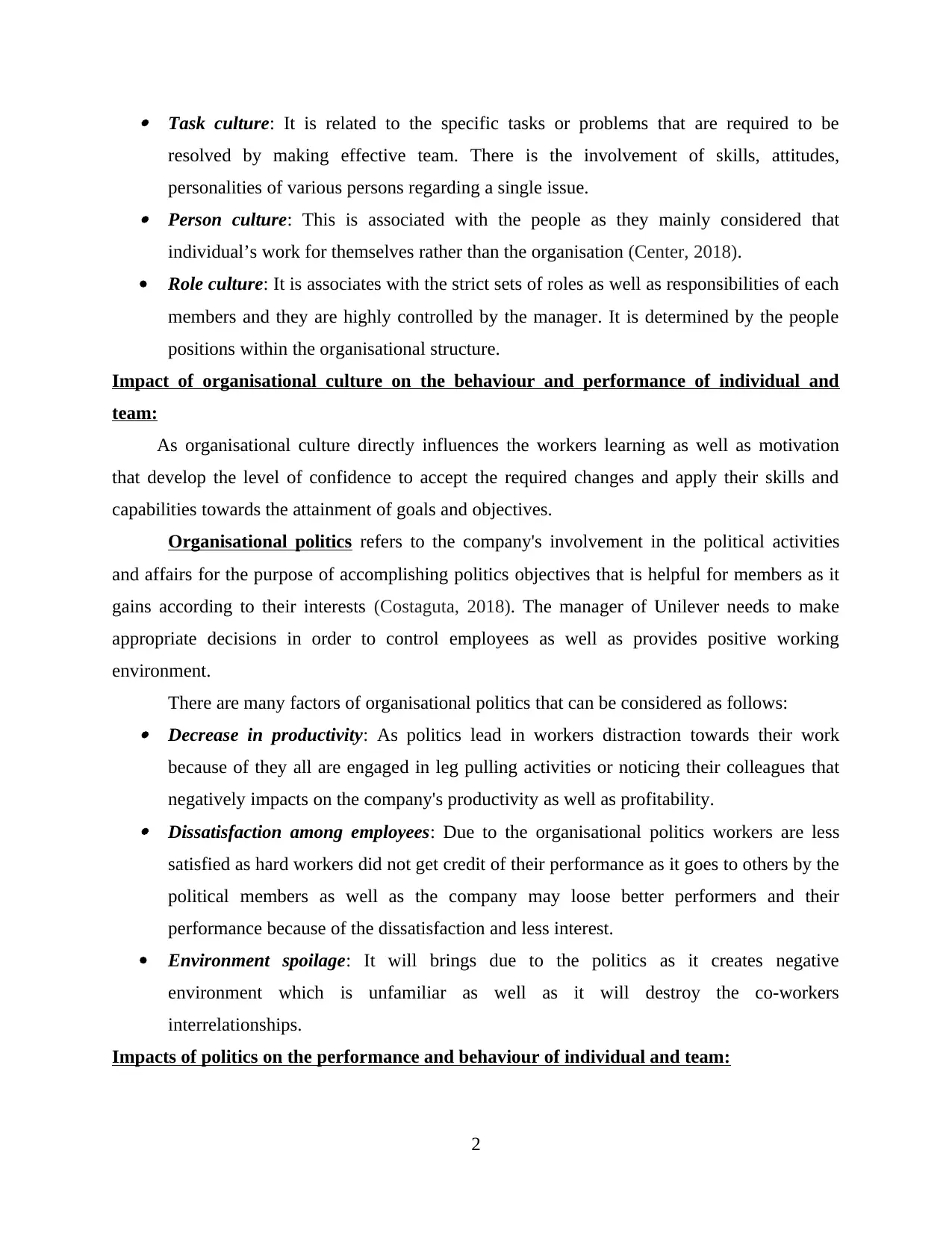
Task culture: It is related to the specific tasks or problems that are required to be
resolved by making effective team. There is the involvement of skills, attitudes,
personalities of various persons regarding a single issue. Person culture: This is associated with the people as they mainly considered that
individual’s work for themselves rather than the organisation (Center, 2018).
Role culture: It is associates with the strict sets of roles as well as responsibilities of each
members and they are highly controlled by the manager. It is determined by the people
positions within the organisational structure.
Impact of organisational culture on the behaviour and performance of individual and
team:
As organisational culture directly influences the workers learning as well as motivation
that develop the level of confidence to accept the required changes and apply their skills and
capabilities towards the attainment of goals and objectives.
Organisational politics refers to the company's involvement in the political activities
and affairs for the purpose of accomplishing politics objectives that is helpful for members as it
gains according to their interests (Costaguta, 2018). The manager of Unilever needs to make
appropriate decisions in order to control employees as well as provides positive working
environment.
There are many factors of organisational politics that can be considered as follows: Decrease in productivity: As politics lead in workers distraction towards their work
because of they all are engaged in leg pulling activities or noticing their colleagues that
negatively impacts on the company's productivity as well as profitability. Dissatisfaction among employees: Due to the organisational politics workers are less
satisfied as hard workers did not get credit of their performance as it goes to others by the
political members as well as the company may loose better performers and their
performance because of the dissatisfaction and less interest.
Environment spoilage: It will brings due to the politics as it creates negative
environment which is unfamiliar as well as it will destroy the co-workers
interrelationships.
Impacts of politics on the performance and behaviour of individual and team:
2
resolved by making effective team. There is the involvement of skills, attitudes,
personalities of various persons regarding a single issue. Person culture: This is associated with the people as they mainly considered that
individual’s work for themselves rather than the organisation (Center, 2018).
Role culture: It is associates with the strict sets of roles as well as responsibilities of each
members and they are highly controlled by the manager. It is determined by the people
positions within the organisational structure.
Impact of organisational culture on the behaviour and performance of individual and
team:
As organisational culture directly influences the workers learning as well as motivation
that develop the level of confidence to accept the required changes and apply their skills and
capabilities towards the attainment of goals and objectives.
Organisational politics refers to the company's involvement in the political activities
and affairs for the purpose of accomplishing politics objectives that is helpful for members as it
gains according to their interests (Costaguta, 2018). The manager of Unilever needs to make
appropriate decisions in order to control employees as well as provides positive working
environment.
There are many factors of organisational politics that can be considered as follows: Decrease in productivity: As politics lead in workers distraction towards their work
because of they all are engaged in leg pulling activities or noticing their colleagues that
negatively impacts on the company's productivity as well as profitability. Dissatisfaction among employees: Due to the organisational politics workers are less
satisfied as hard workers did not get credit of their performance as it goes to others by the
political members as well as the company may loose better performers and their
performance because of the dissatisfaction and less interest.
Environment spoilage: It will brings due to the politics as it creates negative
environment which is unfamiliar as well as it will destroy the co-workers
interrelationships.
Impacts of politics on the performance and behaviour of individual and team:
2
Paraphrase This Document
Need a fresh take? Get an instant paraphrase of this document with our AI Paraphraser
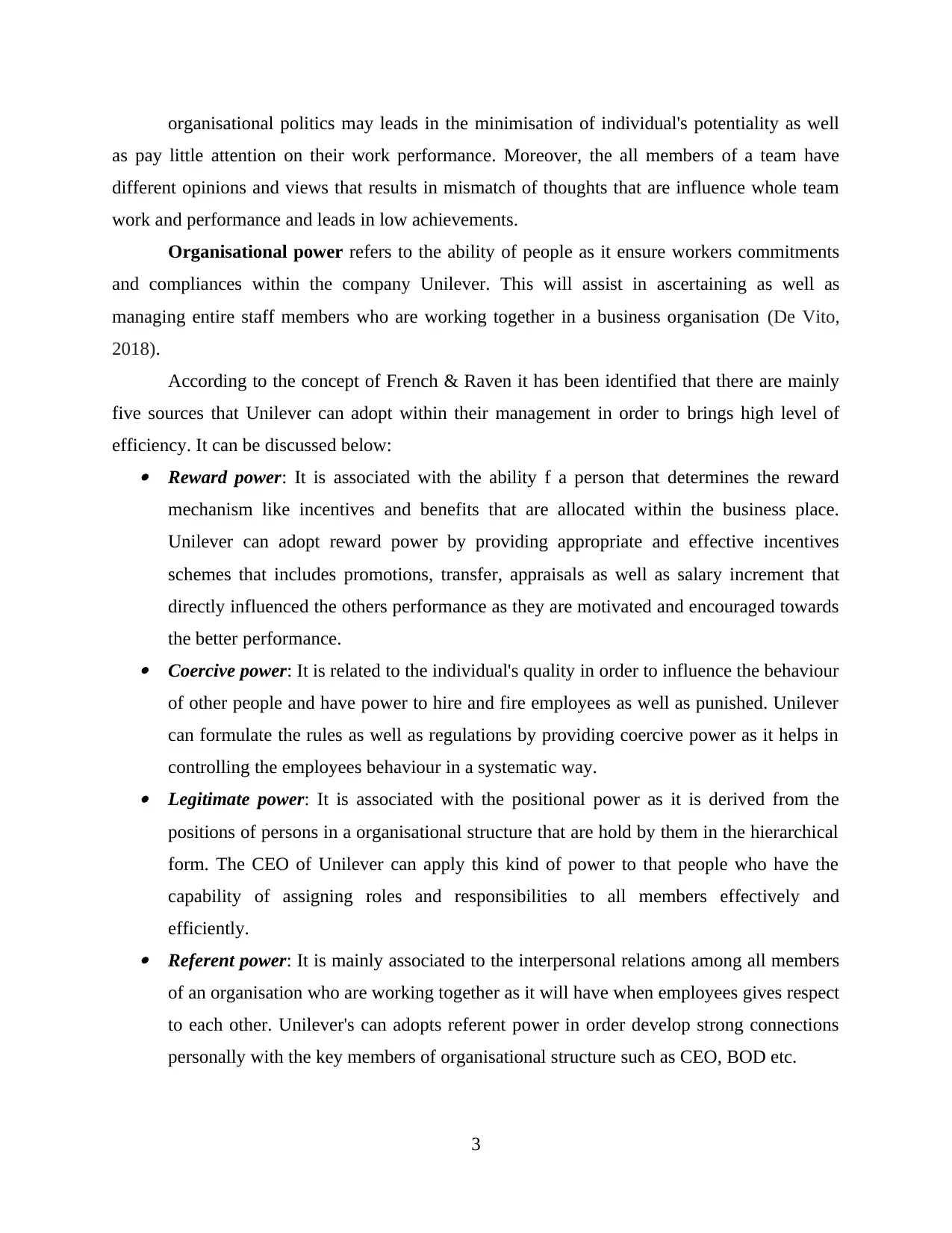
organisational politics may leads in the minimisation of individual's potentiality as well
as pay little attention on their work performance. Moreover, the all members of a team have
different opinions and views that results in mismatch of thoughts that are influence whole team
work and performance and leads in low achievements.
Organisational power refers to the ability of people as it ensure workers commitments
and compliances within the company Unilever. This will assist in ascertaining as well as
managing entire staff members who are working together in a business organisation (De Vito,
2018).
According to the concept of French & Raven it has been identified that there are mainly
five sources that Unilever can adopt within their management in order to brings high level of
efficiency. It can be discussed below: Reward power: It is associated with the ability f a person that determines the reward
mechanism like incentives and benefits that are allocated within the business place.
Unilever can adopt reward power by providing appropriate and effective incentives
schemes that includes promotions, transfer, appraisals as well as salary increment that
directly influenced the others performance as they are motivated and encouraged towards
the better performance. Coercive power: It is related to the individual's quality in order to influence the behaviour
of other people and have power to hire and fire employees as well as punished. Unilever
can formulate the rules as well as regulations by providing coercive power as it helps in
controlling the employees behaviour in a systematic way. Legitimate power: It is associated with the positional power as it is derived from the
positions of persons in a organisational structure that are hold by them in the hierarchical
form. The CEO of Unilever can apply this kind of power to that people who have the
capability of assigning roles and responsibilities to all members effectively and
efficiently. Referent power: It is mainly associated to the interpersonal relations among all members
of an organisation who are working together as it will have when employees gives respect
to each other. Unilever's can adopts referent power in order develop strong connections
personally with the key members of organisational structure such as CEO, BOD etc.
3
as pay little attention on their work performance. Moreover, the all members of a team have
different opinions and views that results in mismatch of thoughts that are influence whole team
work and performance and leads in low achievements.
Organisational power refers to the ability of people as it ensure workers commitments
and compliances within the company Unilever. This will assist in ascertaining as well as
managing entire staff members who are working together in a business organisation (De Vito,
2018).
According to the concept of French & Raven it has been identified that there are mainly
five sources that Unilever can adopt within their management in order to brings high level of
efficiency. It can be discussed below: Reward power: It is associated with the ability f a person that determines the reward
mechanism like incentives and benefits that are allocated within the business place.
Unilever can adopt reward power by providing appropriate and effective incentives
schemes that includes promotions, transfer, appraisals as well as salary increment that
directly influenced the others performance as they are motivated and encouraged towards
the better performance. Coercive power: It is related to the individual's quality in order to influence the behaviour
of other people and have power to hire and fire employees as well as punished. Unilever
can formulate the rules as well as regulations by providing coercive power as it helps in
controlling the employees behaviour in a systematic way. Legitimate power: It is associated with the positional power as it is derived from the
positions of persons in a organisational structure that are hold by them in the hierarchical
form. The CEO of Unilever can apply this kind of power to that people who have the
capability of assigning roles and responsibilities to all members effectively and
efficiently. Referent power: It is mainly associated to the interpersonal relations among all members
of an organisation who are working together as it will have when employees gives respect
to each other. Unilever's can adopts referent power in order develop strong connections
personally with the key members of organisational structure such as CEO, BOD etc.
3
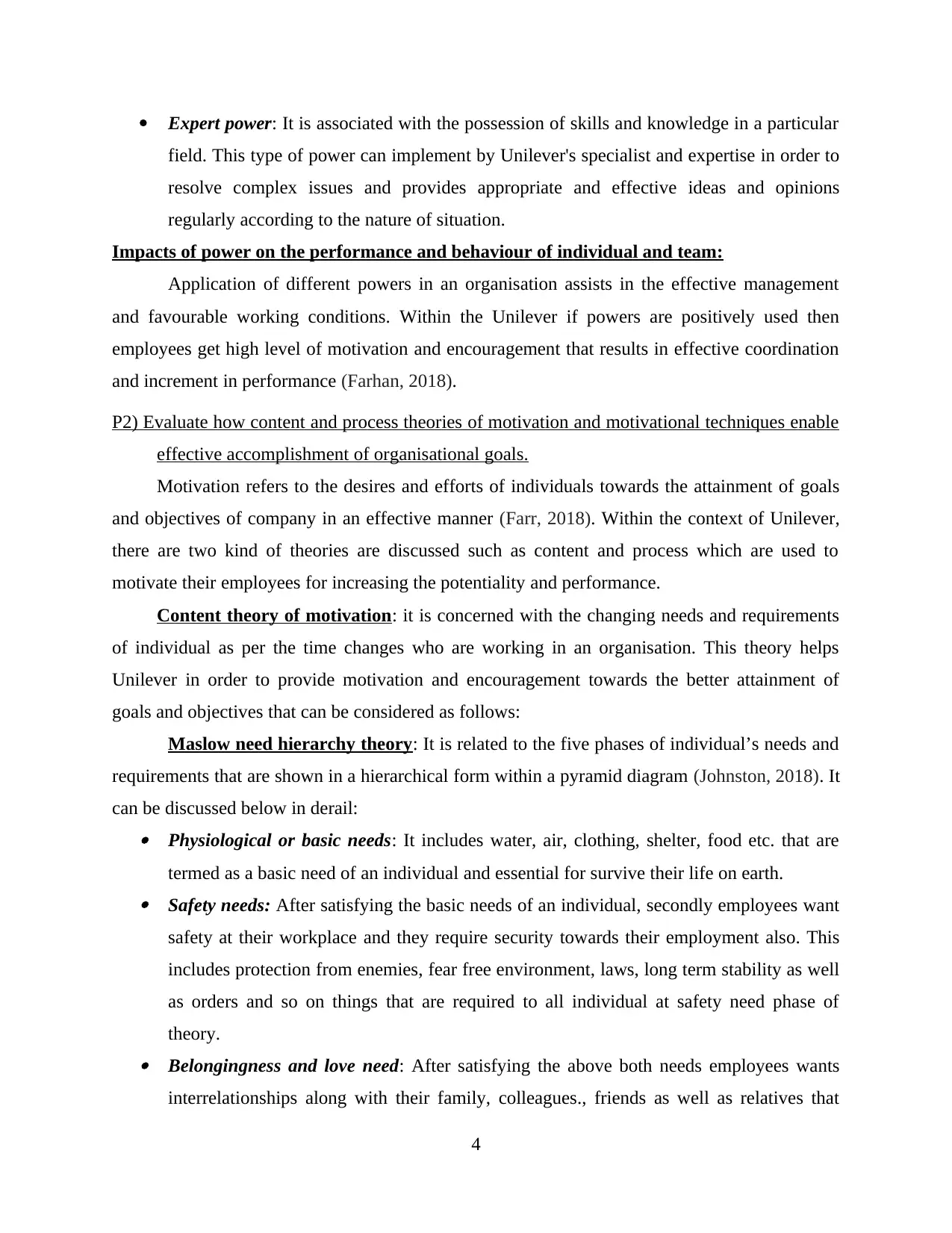
Expert power: It is associated with the possession of skills and knowledge in a particular
field. This type of power can implement by Unilever's specialist and expertise in order to
resolve complex issues and provides appropriate and effective ideas and opinions
regularly according to the nature of situation.
Impacts of power on the performance and behaviour of individual and team:
Application of different powers in an organisation assists in the effective management
and favourable working conditions. Within the Unilever if powers are positively used then
employees get high level of motivation and encouragement that results in effective coordination
and increment in performance (Farhan, 2018).
P2) Evaluate how content and process theories of motivation and motivational techniques enable
effective accomplishment of organisational goals.
Motivation refers to the desires and efforts of individuals towards the attainment of goals
and objectives of company in an effective manner (Farr, 2018). Within the context of Unilever,
there are two kind of theories are discussed such as content and process which are used to
motivate their employees for increasing the potentiality and performance.
Content theory of motivation: it is concerned with the changing needs and requirements
of individual as per the time changes who are working in an organisation. This theory helps
Unilever in order to provide motivation and encouragement towards the better attainment of
goals and objectives that can be considered as follows:
Maslow need hierarchy theory: It is related to the five phases of individual’s needs and
requirements that are shown in a hierarchical form within a pyramid diagram (Johnston, 2018). It
can be discussed below in derail: Physiological or basic needs: It includes water, air, clothing, shelter, food etc. that are
termed as a basic need of an individual and essential for survive their life on earth. Safety needs: After satisfying the basic needs of an individual, secondly employees want
safety at their workplace and they require security towards their employment also. This
includes protection from enemies, fear free environment, laws, long term stability as well
as orders and so on things that are required to all individual at safety need phase of
theory. Belongingness and love need: After satisfying the above both needs employees wants
interrelationships along with their family, colleagues., friends as well as relatives that
4
field. This type of power can implement by Unilever's specialist and expertise in order to
resolve complex issues and provides appropriate and effective ideas and opinions
regularly according to the nature of situation.
Impacts of power on the performance and behaviour of individual and team:
Application of different powers in an organisation assists in the effective management
and favourable working conditions. Within the Unilever if powers are positively used then
employees get high level of motivation and encouragement that results in effective coordination
and increment in performance (Farhan, 2018).
P2) Evaluate how content and process theories of motivation and motivational techniques enable
effective accomplishment of organisational goals.
Motivation refers to the desires and efforts of individuals towards the attainment of goals
and objectives of company in an effective manner (Farr, 2018). Within the context of Unilever,
there are two kind of theories are discussed such as content and process which are used to
motivate their employees for increasing the potentiality and performance.
Content theory of motivation: it is concerned with the changing needs and requirements
of individual as per the time changes who are working in an organisation. This theory helps
Unilever in order to provide motivation and encouragement towards the better attainment of
goals and objectives that can be considered as follows:
Maslow need hierarchy theory: It is related to the five phases of individual’s needs and
requirements that are shown in a hierarchical form within a pyramid diagram (Johnston, 2018). It
can be discussed below in derail: Physiological or basic needs: It includes water, air, clothing, shelter, food etc. that are
termed as a basic need of an individual and essential for survive their life on earth. Safety needs: After satisfying the basic needs of an individual, secondly employees want
safety at their workplace and they require security towards their employment also. This
includes protection from enemies, fear free environment, laws, long term stability as well
as orders and so on things that are required to all individual at safety need phase of
theory. Belongingness and love need: After satisfying the above both needs employees wants
interrelationships along with their family, colleagues., friends as well as relatives that
4
⊘ This is a preview!⊘
Do you want full access?
Subscribe today to unlock all pages.

Trusted by 1+ million students worldwide
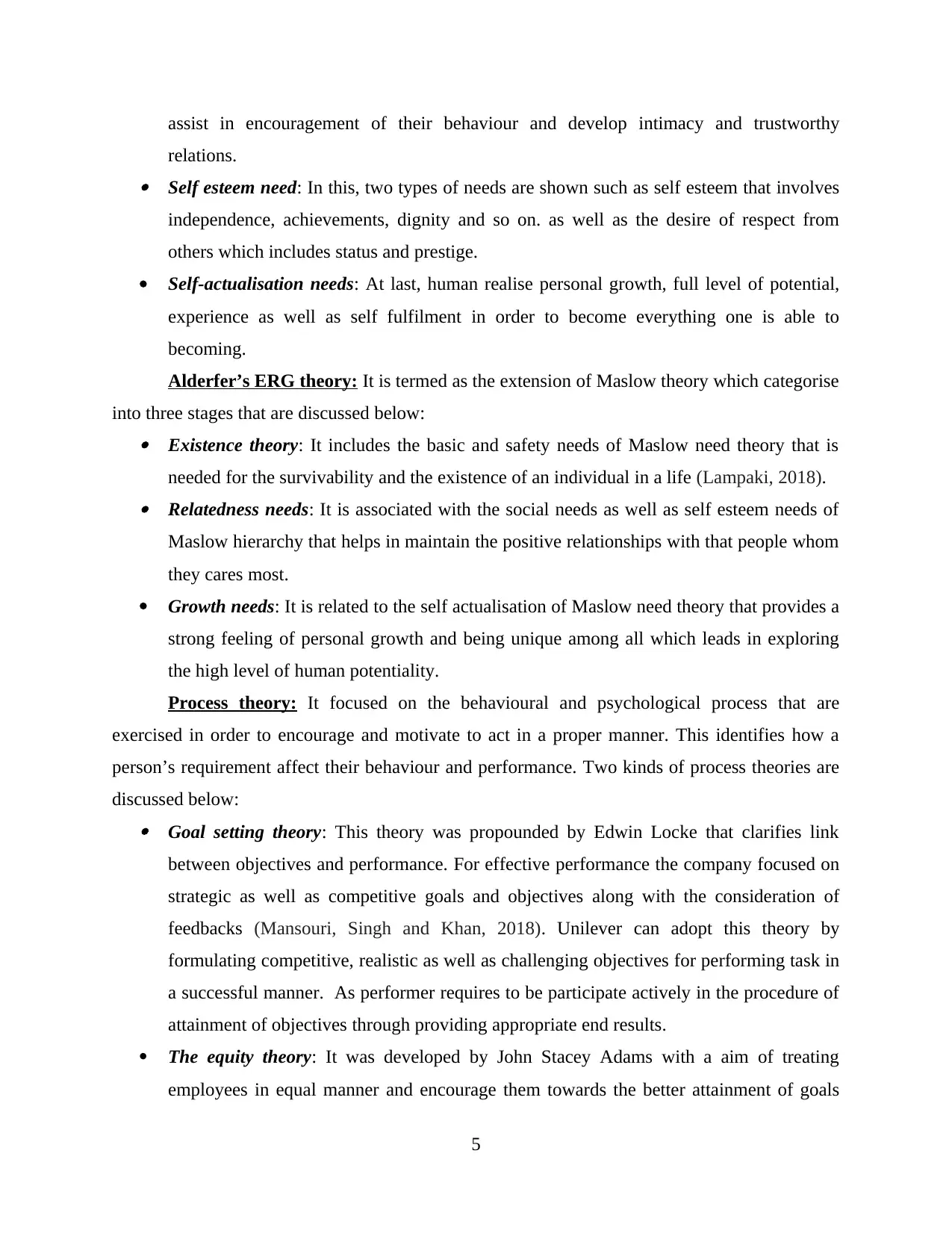
assist in encouragement of their behaviour and develop intimacy and trustworthy
relations. Self esteem need: In this, two types of needs are shown such as self esteem that involves
independence, achievements, dignity and so on. as well as the desire of respect from
others which includes status and prestige.
Self-actualisation needs: At last, human realise personal growth, full level of potential,
experience as well as self fulfilment in order to become everything one is able to
becoming.
Alderfer’s ERG theory: It is termed as the extension of Maslow theory which categorise
into three stages that are discussed below: Existence theory: It includes the basic and safety needs of Maslow need theory that is
needed for the survivability and the existence of an individual in a life (Lampaki, 2018). Relatedness needs: It is associated with the social needs as well as self esteem needs of
Maslow hierarchy that helps in maintain the positive relationships with that people whom
they cares most.
Growth needs: It is related to the self actualisation of Maslow need theory that provides a
strong feeling of personal growth and being unique among all which leads in exploring
the high level of human potentiality.
Process theory: It focused on the behavioural and psychological process that are
exercised in order to encourage and motivate to act in a proper manner. This identifies how a
person’s requirement affect their behaviour and performance. Two kinds of process theories are
discussed below: Goal setting theory: This theory was propounded by Edwin Locke that clarifies link
between objectives and performance. For effective performance the company focused on
strategic as well as competitive goals and objectives along with the consideration of
feedbacks (Mansouri, Singh and Khan, 2018). Unilever can adopt this theory by
formulating competitive, realistic as well as challenging objectives for performing task in
a successful manner. As performer requires to be participate actively in the procedure of
attainment of objectives through providing appropriate end results.
The equity theory: It was developed by John Stacey Adams with a aim of treating
employees in equal manner and encourage them towards the better attainment of goals
5
relations. Self esteem need: In this, two types of needs are shown such as self esteem that involves
independence, achievements, dignity and so on. as well as the desire of respect from
others which includes status and prestige.
Self-actualisation needs: At last, human realise personal growth, full level of potential,
experience as well as self fulfilment in order to become everything one is able to
becoming.
Alderfer’s ERG theory: It is termed as the extension of Maslow theory which categorise
into three stages that are discussed below: Existence theory: It includes the basic and safety needs of Maslow need theory that is
needed for the survivability and the existence of an individual in a life (Lampaki, 2018). Relatedness needs: It is associated with the social needs as well as self esteem needs of
Maslow hierarchy that helps in maintain the positive relationships with that people whom
they cares most.
Growth needs: It is related to the self actualisation of Maslow need theory that provides a
strong feeling of personal growth and being unique among all which leads in exploring
the high level of human potentiality.
Process theory: It focused on the behavioural and psychological process that are
exercised in order to encourage and motivate to act in a proper manner. This identifies how a
person’s requirement affect their behaviour and performance. Two kinds of process theories are
discussed below: Goal setting theory: This theory was propounded by Edwin Locke that clarifies link
between objectives and performance. For effective performance the company focused on
strategic as well as competitive goals and objectives along with the consideration of
feedbacks (Mansouri, Singh and Khan, 2018). Unilever can adopt this theory by
formulating competitive, realistic as well as challenging objectives for performing task in
a successful manner. As performer requires to be participate actively in the procedure of
attainment of objectives through providing appropriate end results.
The equity theory: It was developed by John Stacey Adams with a aim of treating
employees in equal manner and encourage them towards the better attainment of goals
5
Paraphrase This Document
Need a fresh take? Get an instant paraphrase of this document with our AI Paraphraser
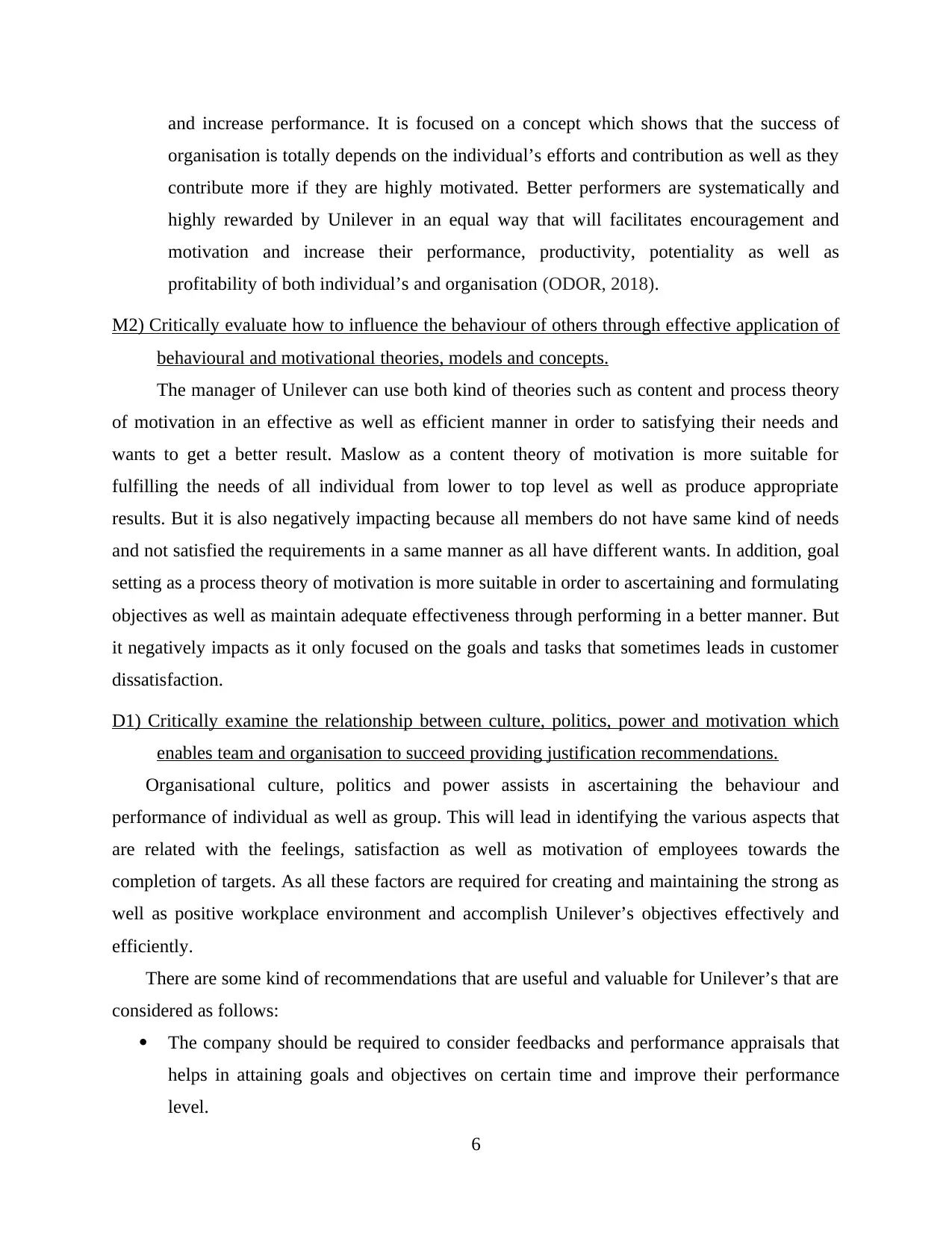
and increase performance. It is focused on a concept which shows that the success of
organisation is totally depends on the individual’s efforts and contribution as well as they
contribute more if they are highly motivated. Better performers are systematically and
highly rewarded by Unilever in an equal way that will facilitates encouragement and
motivation and increase their performance, productivity, potentiality as well as
profitability of both individual’s and organisation (ODOR, 2018).
M2) Critically evaluate how to influence the behaviour of others through effective application of
behavioural and motivational theories, models and concepts.
The manager of Unilever can use both kind of theories such as content and process theory
of motivation in an effective as well as efficient manner in order to satisfying their needs and
wants to get a better result. Maslow as a content theory of motivation is more suitable for
fulfilling the needs of all individual from lower to top level as well as produce appropriate
results. But it is also negatively impacting because all members do not have same kind of needs
and not satisfied the requirements in a same manner as all have different wants. In addition, goal
setting as a process theory of motivation is more suitable in order to ascertaining and formulating
objectives as well as maintain adequate effectiveness through performing in a better manner. But
it negatively impacts as it only focused on the goals and tasks that sometimes leads in customer
dissatisfaction.
D1) Critically examine the relationship between culture, politics, power and motivation which
enables team and organisation to succeed providing justification recommendations.
Organisational culture, politics and power assists in ascertaining the behaviour and
performance of individual as well as group. This will lead in identifying the various aspects that
are related with the feelings, satisfaction as well as motivation of employees towards the
completion of targets. As all these factors are required for creating and maintaining the strong as
well as positive workplace environment and accomplish Unilever’s objectives effectively and
efficiently.
There are some kind of recommendations that are useful and valuable for Unilever’s that are
considered as follows:
The company should be required to consider feedbacks and performance appraisals that
helps in attaining goals and objectives on certain time and improve their performance
level.
6
organisation is totally depends on the individual’s efforts and contribution as well as they
contribute more if they are highly motivated. Better performers are systematically and
highly rewarded by Unilever in an equal way that will facilitates encouragement and
motivation and increase their performance, productivity, potentiality as well as
profitability of both individual’s and organisation (ODOR, 2018).
M2) Critically evaluate how to influence the behaviour of others through effective application of
behavioural and motivational theories, models and concepts.
The manager of Unilever can use both kind of theories such as content and process theory
of motivation in an effective as well as efficient manner in order to satisfying their needs and
wants to get a better result. Maslow as a content theory of motivation is more suitable for
fulfilling the needs of all individual from lower to top level as well as produce appropriate
results. But it is also negatively impacting because all members do not have same kind of needs
and not satisfied the requirements in a same manner as all have different wants. In addition, goal
setting as a process theory of motivation is more suitable in order to ascertaining and formulating
objectives as well as maintain adequate effectiveness through performing in a better manner. But
it negatively impacts as it only focused on the goals and tasks that sometimes leads in customer
dissatisfaction.
D1) Critically examine the relationship between culture, politics, power and motivation which
enables team and organisation to succeed providing justification recommendations.
Organisational culture, politics and power assists in ascertaining the behaviour and
performance of individual as well as group. This will lead in identifying the various aspects that
are related with the feelings, satisfaction as well as motivation of employees towards the
completion of targets. As all these factors are required for creating and maintaining the strong as
well as positive workplace environment and accomplish Unilever’s objectives effectively and
efficiently.
There are some kind of recommendations that are useful and valuable for Unilever’s that are
considered as follows:
The company should be required to consider feedbacks and performance appraisals that
helps in attaining goals and objectives on certain time and improve their performance
level.
6
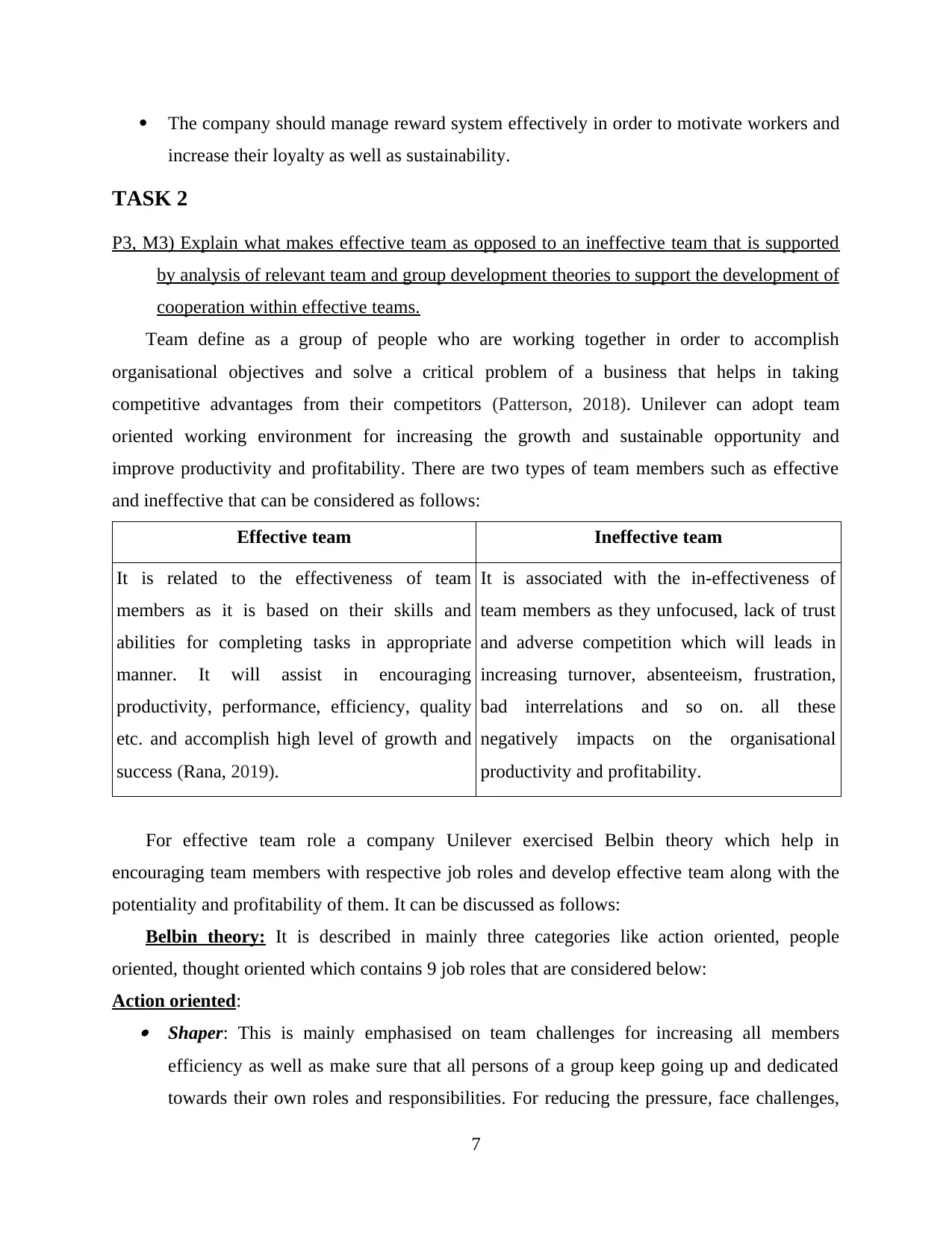
The company should manage reward system effectively in order to motivate workers and
increase their loyalty as well as sustainability.
TASK 2
P3, M3) Explain what makes effective team as opposed to an ineffective team that is supported
by analysis of relevant team and group development theories to support the development of
cooperation within effective teams.
Team define as a group of people who are working together in order to accomplish
organisational objectives and solve a critical problem of a business that helps in taking
competitive advantages from their competitors (Patterson, 2018). Unilever can adopt team
oriented working environment for increasing the growth and sustainable opportunity and
improve productivity and profitability. There are two types of team members such as effective
and ineffective that can be considered as follows:
Effective team Ineffective team
It is related to the effectiveness of team
members as it is based on their skills and
abilities for completing tasks in appropriate
manner. It will assist in encouraging
productivity, performance, efficiency, quality
etc. and accomplish high level of growth and
success (Rana, 2019).
It is associated with the in-effectiveness of
team members as they unfocused, lack of trust
and adverse competition which will leads in
increasing turnover, absenteeism, frustration,
bad interrelations and so on. all these
negatively impacts on the organisational
productivity and profitability.
For effective team role a company Unilever exercised Belbin theory which help in
encouraging team members with respective job roles and develop effective team along with the
potentiality and profitability of them. It can be discussed as follows:
Belbin theory: It is described in mainly three categories like action oriented, people
oriented, thought oriented which contains 9 job roles that are considered below:
Action oriented: Shaper: This is mainly emphasised on team challenges for increasing all members
efficiency as well as make sure that all persons of a group keep going up and dedicated
towards their own roles and responsibilities. For reducing the pressure, face challenges,
7
increase their loyalty as well as sustainability.
TASK 2
P3, M3) Explain what makes effective team as opposed to an ineffective team that is supported
by analysis of relevant team and group development theories to support the development of
cooperation within effective teams.
Team define as a group of people who are working together in order to accomplish
organisational objectives and solve a critical problem of a business that helps in taking
competitive advantages from their competitors (Patterson, 2018). Unilever can adopt team
oriented working environment for increasing the growth and sustainable opportunity and
improve productivity and profitability. There are two types of team members such as effective
and ineffective that can be considered as follows:
Effective team Ineffective team
It is related to the effectiveness of team
members as it is based on their skills and
abilities for completing tasks in appropriate
manner. It will assist in encouraging
productivity, performance, efficiency, quality
etc. and accomplish high level of growth and
success (Rana, 2019).
It is associated with the in-effectiveness of
team members as they unfocused, lack of trust
and adverse competition which will leads in
increasing turnover, absenteeism, frustration,
bad interrelations and so on. all these
negatively impacts on the organisational
productivity and profitability.
For effective team role a company Unilever exercised Belbin theory which help in
encouraging team members with respective job roles and develop effective team along with the
potentiality and profitability of them. It can be discussed as follows:
Belbin theory: It is described in mainly three categories like action oriented, people
oriented, thought oriented which contains 9 job roles that are considered below:
Action oriented: Shaper: This is mainly emphasised on team challenges for increasing all members
efficiency as well as make sure that all persons of a group keep going up and dedicated
towards their own roles and responsibilities. For reducing the pressure, face challenges,
7
⊘ This is a preview!⊘
Do you want full access?
Subscribe today to unlock all pages.

Trusted by 1+ million students worldwide
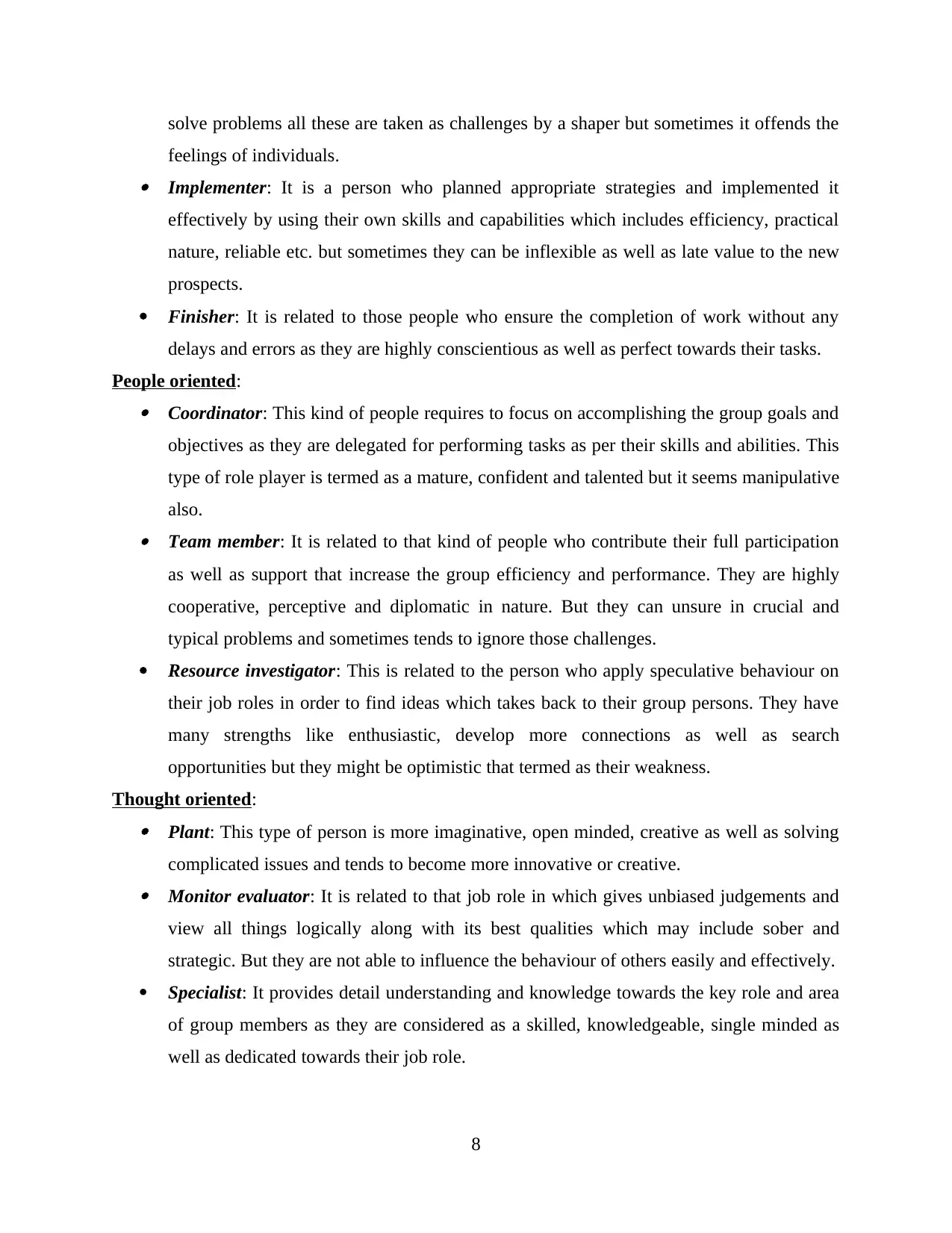
solve problems all these are taken as challenges by a shaper but sometimes it offends the
feelings of individuals. Implementer: It is a person who planned appropriate strategies and implemented it
effectively by using their own skills and capabilities which includes efficiency, practical
nature, reliable etc. but sometimes they can be inflexible as well as late value to the new
prospects.
Finisher: It is related to those people who ensure the completion of work without any
delays and errors as they are highly conscientious as well as perfect towards their tasks.
People oriented: Coordinator: This kind of people requires to focus on accomplishing the group goals and
objectives as they are delegated for performing tasks as per their skills and abilities. This
type of role player is termed as a mature, confident and talented but it seems manipulative
also. Team member: It is related to that kind of people who contribute their full participation
as well as support that increase the group efficiency and performance. They are highly
cooperative, perceptive and diplomatic in nature. But they can unsure in crucial and
typical problems and sometimes tends to ignore those challenges.
Resource investigator: This is related to the person who apply speculative behaviour on
their job roles in order to find ideas which takes back to their group persons. They have
many strengths like enthusiastic, develop more connections as well as search
opportunities but they might be optimistic that termed as their weakness.
Thought oriented: Plant: This type of person is more imaginative, open minded, creative as well as solving
complicated issues and tends to become more innovative or creative. Monitor evaluator: It is related to that job role in which gives unbiased judgements and
view all things logically along with its best qualities which may include sober and
strategic. But they are not able to influence the behaviour of others easily and effectively.
Specialist: It provides detail understanding and knowledge towards the key role and area
of group members as they are considered as a skilled, knowledgeable, single minded as
well as dedicated towards their job role.
8
feelings of individuals. Implementer: It is a person who planned appropriate strategies and implemented it
effectively by using their own skills and capabilities which includes efficiency, practical
nature, reliable etc. but sometimes they can be inflexible as well as late value to the new
prospects.
Finisher: It is related to those people who ensure the completion of work without any
delays and errors as they are highly conscientious as well as perfect towards their tasks.
People oriented: Coordinator: This kind of people requires to focus on accomplishing the group goals and
objectives as they are delegated for performing tasks as per their skills and abilities. This
type of role player is termed as a mature, confident and talented but it seems manipulative
also. Team member: It is related to that kind of people who contribute their full participation
as well as support that increase the group efficiency and performance. They are highly
cooperative, perceptive and diplomatic in nature. But they can unsure in crucial and
typical problems and sometimes tends to ignore those challenges.
Resource investigator: This is related to the person who apply speculative behaviour on
their job roles in order to find ideas which takes back to their group persons. They have
many strengths like enthusiastic, develop more connections as well as search
opportunities but they might be optimistic that termed as their weakness.
Thought oriented: Plant: This type of person is more imaginative, open minded, creative as well as solving
complicated issues and tends to become more innovative or creative. Monitor evaluator: It is related to that job role in which gives unbiased judgements and
view all things logically along with its best qualities which may include sober and
strategic. But they are not able to influence the behaviour of others easily and effectively.
Specialist: It provides detail understanding and knowledge towards the key role and area
of group members as they are considered as a skilled, knowledgeable, single minded as
well as dedicated towards their job role.
8
Paraphrase This Document
Need a fresh take? Get an instant paraphrase of this document with our AI Paraphraser
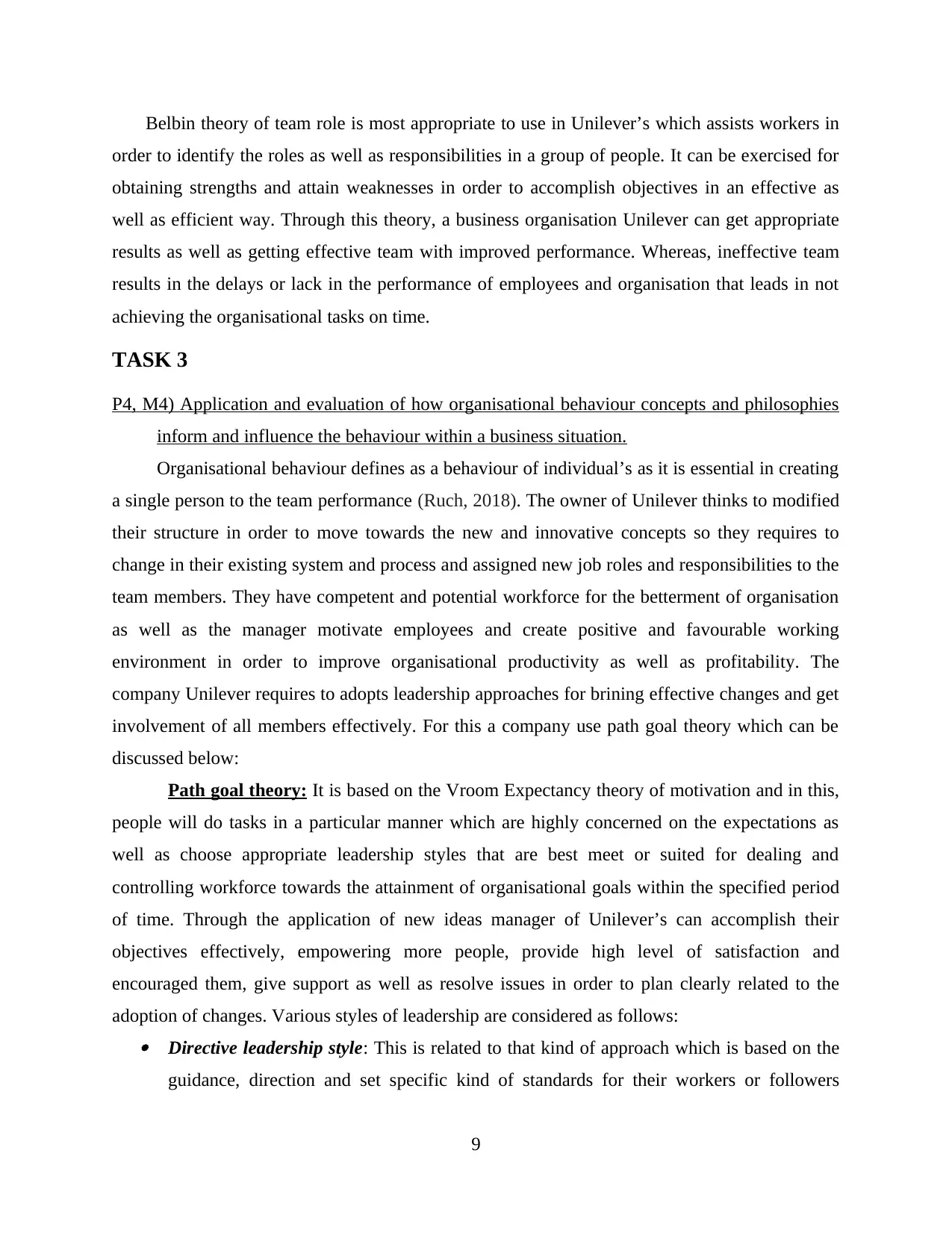
Belbin theory of team role is most appropriate to use in Unilever’s which assists workers in
order to identify the roles as well as responsibilities in a group of people. It can be exercised for
obtaining strengths and attain weaknesses in order to accomplish objectives in an effective as
well as efficient way. Through this theory, a business organisation Unilever can get appropriate
results as well as getting effective team with improved performance. Whereas, ineffective team
results in the delays or lack in the performance of employees and organisation that leads in not
achieving the organisational tasks on time.
TASK 3
P4, M4) Application and evaluation of how organisational behaviour concepts and philosophies
inform and influence the behaviour within a business situation.
Organisational behaviour defines as a behaviour of individual’s as it is essential in creating
a single person to the team performance (Ruch, 2018). The owner of Unilever thinks to modified
their structure in order to move towards the new and innovative concepts so they requires to
change in their existing system and process and assigned new job roles and responsibilities to the
team members. They have competent and potential workforce for the betterment of organisation
as well as the manager motivate employees and create positive and favourable working
environment in order to improve organisational productivity as well as profitability. The
company Unilever requires to adopts leadership approaches for brining effective changes and get
involvement of all members effectively. For this a company use path goal theory which can be
discussed below:
Path goal theory: It is based on the Vroom Expectancy theory of motivation and in this,
people will do tasks in a particular manner which are highly concerned on the expectations as
well as choose appropriate leadership styles that are best meet or suited for dealing and
controlling workforce towards the attainment of organisational goals within the specified period
of time. Through the application of new ideas manager of Unilever’s can accomplish their
objectives effectively, empowering more people, provide high level of satisfaction and
encouraged them, give support as well as resolve issues in order to plan clearly related to the
adoption of changes. Various styles of leadership are considered as follows: Directive leadership style: This is related to that kind of approach which is based on the
guidance, direction and set specific kind of standards for their workers or followers
9
order to identify the roles as well as responsibilities in a group of people. It can be exercised for
obtaining strengths and attain weaknesses in order to accomplish objectives in an effective as
well as efficient way. Through this theory, a business organisation Unilever can get appropriate
results as well as getting effective team with improved performance. Whereas, ineffective team
results in the delays or lack in the performance of employees and organisation that leads in not
achieving the organisational tasks on time.
TASK 3
P4, M4) Application and evaluation of how organisational behaviour concepts and philosophies
inform and influence the behaviour within a business situation.
Organisational behaviour defines as a behaviour of individual’s as it is essential in creating
a single person to the team performance (Ruch, 2018). The owner of Unilever thinks to modified
their structure in order to move towards the new and innovative concepts so they requires to
change in their existing system and process and assigned new job roles and responsibilities to the
team members. They have competent and potential workforce for the betterment of organisation
as well as the manager motivate employees and create positive and favourable working
environment in order to improve organisational productivity as well as profitability. The
company Unilever requires to adopts leadership approaches for brining effective changes and get
involvement of all members effectively. For this a company use path goal theory which can be
discussed below:
Path goal theory: It is based on the Vroom Expectancy theory of motivation and in this,
people will do tasks in a particular manner which are highly concerned on the expectations as
well as choose appropriate leadership styles that are best meet or suited for dealing and
controlling workforce towards the attainment of organisational goals within the specified period
of time. Through the application of new ideas manager of Unilever’s can accomplish their
objectives effectively, empowering more people, provide high level of satisfaction and
encouraged them, give support as well as resolve issues in order to plan clearly related to the
adoption of changes. Various styles of leadership are considered as follows: Directive leadership style: This is related to that kind of approach which is based on the
guidance, direction and set specific kind of standards for their workers or followers
9
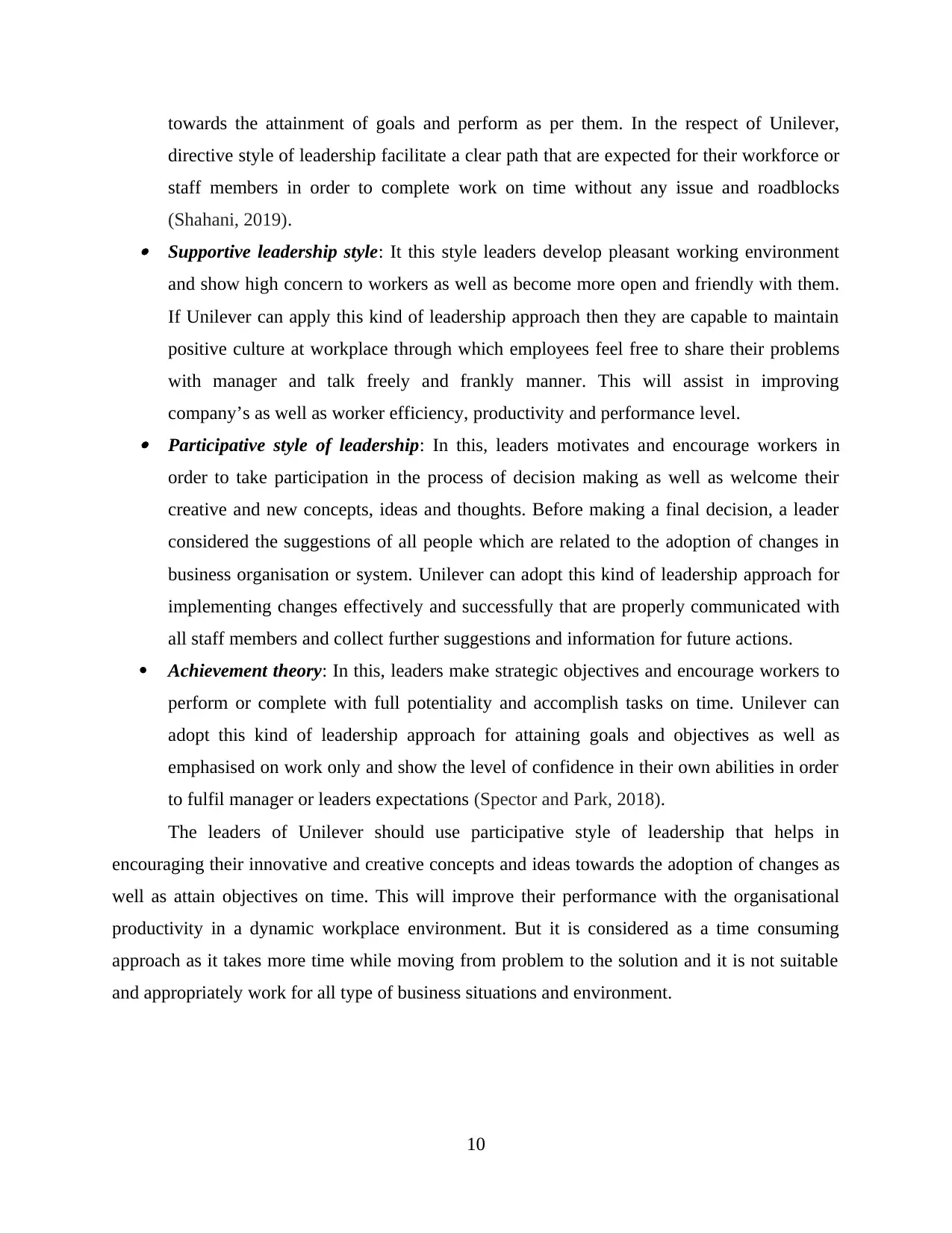
towards the attainment of goals and perform as per them. In the respect of Unilever,
directive style of leadership facilitate a clear path that are expected for their workforce or
staff members in order to complete work on time without any issue and roadblocks
(Shahani, 2019). Supportive leadership style: It this style leaders develop pleasant working environment
and show high concern to workers as well as become more open and friendly with them.
If Unilever can apply this kind of leadership approach then they are capable to maintain
positive culture at workplace through which employees feel free to share their problems
with manager and talk freely and frankly manner. This will assist in improving
company’s as well as worker efficiency, productivity and performance level. Participative style of leadership: In this, leaders motivates and encourage workers in
order to take participation in the process of decision making as well as welcome their
creative and new concepts, ideas and thoughts. Before making a final decision, a leader
considered the suggestions of all people which are related to the adoption of changes in
business organisation or system. Unilever can adopt this kind of leadership approach for
implementing changes effectively and successfully that are properly communicated with
all staff members and collect further suggestions and information for future actions.
Achievement theory: In this, leaders make strategic objectives and encourage workers to
perform or complete with full potentiality and accomplish tasks on time. Unilever can
adopt this kind of leadership approach for attaining goals and objectives as well as
emphasised on work only and show the level of confidence in their own abilities in order
to fulfil manager or leaders expectations (Spector and Park, 2018).
The leaders of Unilever should use participative style of leadership that helps in
encouraging their innovative and creative concepts and ideas towards the adoption of changes as
well as attain objectives on time. This will improve their performance with the organisational
productivity in a dynamic workplace environment. But it is considered as a time consuming
approach as it takes more time while moving from problem to the solution and it is not suitable
and appropriately work for all type of business situations and environment.
10
directive style of leadership facilitate a clear path that are expected for their workforce or
staff members in order to complete work on time without any issue and roadblocks
(Shahani, 2019). Supportive leadership style: It this style leaders develop pleasant working environment
and show high concern to workers as well as become more open and friendly with them.
If Unilever can apply this kind of leadership approach then they are capable to maintain
positive culture at workplace through which employees feel free to share their problems
with manager and talk freely and frankly manner. This will assist in improving
company’s as well as worker efficiency, productivity and performance level. Participative style of leadership: In this, leaders motivates and encourage workers in
order to take participation in the process of decision making as well as welcome their
creative and new concepts, ideas and thoughts. Before making a final decision, a leader
considered the suggestions of all people which are related to the adoption of changes in
business organisation or system. Unilever can adopt this kind of leadership approach for
implementing changes effectively and successfully that are properly communicated with
all staff members and collect further suggestions and information for future actions.
Achievement theory: In this, leaders make strategic objectives and encourage workers to
perform or complete with full potentiality and accomplish tasks on time. Unilever can
adopt this kind of leadership approach for attaining goals and objectives as well as
emphasised on work only and show the level of confidence in their own abilities in order
to fulfil manager or leaders expectations (Spector and Park, 2018).
The leaders of Unilever should use participative style of leadership that helps in
encouraging their innovative and creative concepts and ideas towards the adoption of changes as
well as attain objectives on time. This will improve their performance with the organisational
productivity in a dynamic workplace environment. But it is considered as a time consuming
approach as it takes more time while moving from problem to the solution and it is not suitable
and appropriately work for all type of business situations and environment.
10
⊘ This is a preview!⊘
Do you want full access?
Subscribe today to unlock all pages.

Trusted by 1+ million students worldwide
1 out of 14
Related Documents
Your All-in-One AI-Powered Toolkit for Academic Success.
+13062052269
info@desklib.com
Available 24*7 on WhatsApp / Email
![[object Object]](/_next/static/media/star-bottom.7253800d.svg)
Unlock your academic potential
Copyright © 2020–2026 A2Z Services. All Rights Reserved. Developed and managed by ZUCOL.



